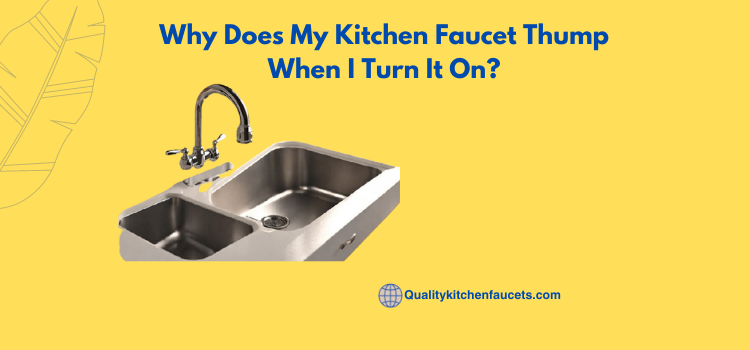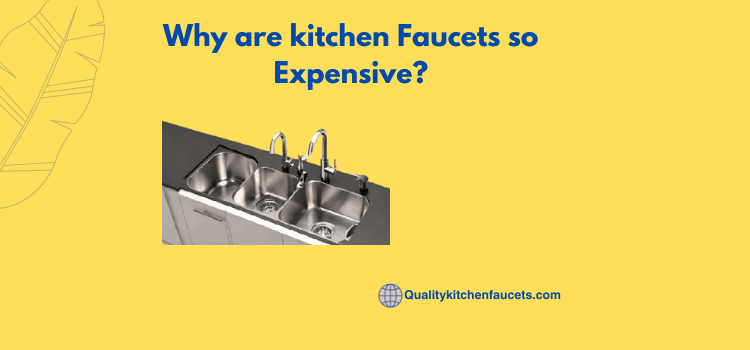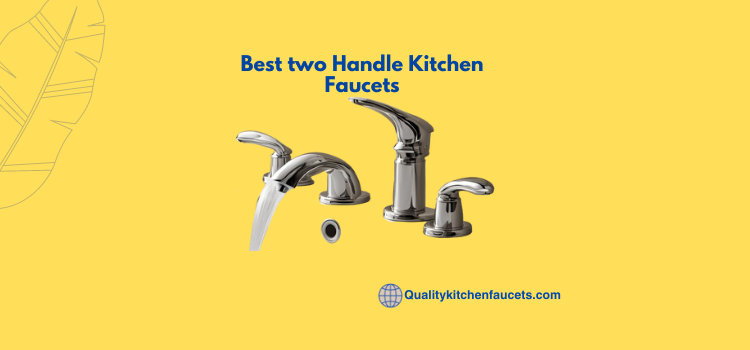Why Does My Kitchen Faucet Thump When I Turn It On?
The unsettling bump you hear Why Does My Kitchen Faucet Thump When I Turn It On? might be more than an irritating noise. It’s a symptom of what’s happening in your plumbing system, called a “water hammer.” This issue can escalate over time, potentially causing significant damage to your pipes.
There are several ways to address this problem, from simple at-home solutions to more comprehensive, plumbing-based interventions. This article is designed to guide you through the various cures for that persistent thumping sound, ensuring the peace and longevity of your plumbing system.
Read on to discover the causes, solutions, and preventive measures related to the ‘water hammer.’ Equip yourself with essential knowledge that can save you from costly repairs in the future. Remember, understanding and addressing the problem early is always better than dealing with the aftermath of neglect.

Why Does My Kitchen Faucet Thump When I Turn It On? In 8 Steps
Step 1: Does some plumbing work need to be done?
Air chambers, also known as shock absorbers, are used in plumbing to prevent water hammering. They are designed to provide an air cushion for water to push against when it changes direction or stops quickly.
If your plumbing system doesn’t have air chambers or has become filled with water, installing or resetting them can resolve the thumping noise from your kitchen spout.
Step 2: Is there air trapped in the pipes? Try running the faucet for a few seconds when turning it on daily to clear any trapped air.
Excessively high hydraulic pressure might be causing the thumping sound when you turn on your sink tap.
Most residential systems are designed for a maximum water pressure of 60–80 psi (pounds per square inch). If your water force exceeds this range, it may lead to water hammering.
Consider installing a pressure-reducing valve or adjusting your existing one to alleviate the issue. A professional plumber can help evaluate and rectify high fluid pressure problems.

Step 3: Could it be low hydrostatic pressure? Check if the thumping happens more when pressure is lower. Repairing any leaks or adding a pressure regulator could help.
Loose pipes can also cause a thumping noise when streamed through them. The pipes may vibrate or knock against surrounding materials as the water moves, resulting in a thumping sound.
Inspecting your plumbing system and ensuring all pipes are secured correctly is advisable. If necessary, add clips or reposition the pipes to avoid any movement.
If you need help with how to proceed, feel free to enlist the help of a professional plumber to check and tighten any loose pipes.
Step 4: Is it time to replace the washer? Worn washers can cause clunking noise as water flows through the faucet.
Over time, sediment and mineral deposits can accumulate in your pipes and faucets, causing flux disruptions and banging noise.
To resolve this, try to clean your faucets and pipes by running hot water or using a commercial cleaning solution.
For stubborn deposits, you might need to manually dislodge the sediment or consider replacing the affected parts of your plumbing system.
Remember that if the task seems overwhelming, call a professional plumber to get the job done efficiently and safely.
Step 5: Could scale be building up inside? Hard water can leave mineral deposits that interfere with discharge. Try soaking the aerator in vinegar to dissolve any buildup.
If the clunking noise comes from only one faucet, it might be an issue with the specific valve. Sometimes, valves can become faulty due to wear and tear or sediment buildup.
The first thing to try is cleaning the valve, as sometimes a bit of debris caught in the valve can cause a clunk sound.
If that doesn’t work, it may be time to replace the valve. Always remember that it’s best to call a professional plumber if you’re uncomfortable performing these tasks.
Step 6: Is the faucet stable? Ensure it’s firmly mounted and won’t wobble or move when water runs. Tightening any connections may stop the thumping.
Specific faucet designs, particularly older models, are more susceptible to causing hammering noise due to their construction and the flow rate through them. If you’ve tried all the steps without success, the faucet design might be the problem.
Consider replacing your faucet with a more modern design that is less likely to cause a water hammer or knocking noise.
Engaging a professional plumber is best if you need more confidence about carrying out this task. They can guide you on the best models to suit your needs and carry out the installation to ensure it’s done correctly and safely.

Step 7: Is it only cold or hot water? Switch out the washers individually to pinpoint if one side needs more attention.
The temperature of the water running through your pipes can also affect the occurrence of a water hammer. This may lead to pounding noise, especially in unsecurely fastened pipes.
This could be the issue if you notice the banging noise happens more often when running hot water. A suitable fix could involve securing the pipes more tightly or installing insulation to minimize the temperature effects. Once again, a professional plumber can provide the most accurate diagnosis and solution.
Step 8: When did the noise start? Changes to pipework pressure or recent work could offer clues to the cause.
Sometimes, introducing a new appliance or plumbing fixture can alter the dynamics of your plumbing system, resulting in a thumping sound.
Appliances like washing machines, dishwashers, or even a new showerhead can increase water demand, causing changes in hydrostatic pressure. If the hammering noise started after installing a new appliance or fixture, this could be the cause.
It’s recommended to seek professional assistance to adjust your plumbing system appropriately to accommodate these changes without causing any unwanted noises.
Conclusion
In conclusion, the mystery behind your kitchen faucet’s strange knocking noise may have been solved, but there is still much to learn and more underlying issues to address.
Everyone, from plumbing experts to DIY enthusiasts, has a different perspective on why this phenomenon occurs.
Some believe it could be due to air trapped in the pipes; others think it’s a sign of worn-out valves or loose connections.
While we may never truly know the exact cause of every scenario, proper maintenance and care for your faucets can significantly reduce the likelihood of any odd noises or malfunctions.
So next time you hear that dreaded thumping sound, don’t panic; take a deep breath and try some of the solutions mentioned in this post.
Happy and peaceful kitchen experiences await!
FAQs
Why does it thump when I turn on my faucet?
When you turn on your faucet, a water hammer, trapped air in the pipes, loose connections, or worn-out valves often cause a pounding noise.
Why does my water spigot make a banging sound?
The banging sound from your sink faucets is typically due to a water hammer caused by a sudden change in pipework pressure or flow rate.
How do you fix a water hammer on a kitchen faucet?
Fixing a water hammer on a kitchen faucet typically involves:
- Draining the plumbing system to release the trapped air.
- Securing loose pipes.
- Installing a water hammer arrestor.
How do you fix a knocking faucet?
Fixing a knocking faucet can be achieved by identifying the problem source, such as trapped air or loose pipes, and implementing solutions like draining the system or tightening connections.








2 Comments